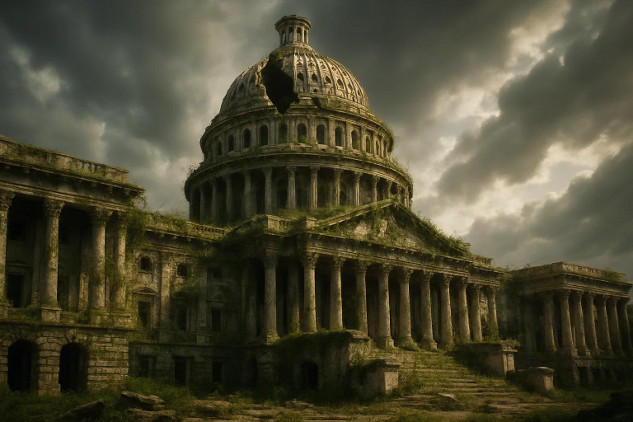
The Founders never imagined this was what 'limited government' would look like.
In This Article
- Why extreme inequality is the oldest—and most dangerous—driver of civilizational collapse
- How past societies failed when elites hoarded wealth and captured governance
- Why today’s global inequality crisis mirrors ancient patterns—on a planetary scale
- The moral failure behind environmental destruction—and why “we’re all responsible” is a lie
- How collapse is still preventable—but only if we act boldly and urgently
How Extreme Inequality Fuels Collapse — And Why This Time Is Different
by Robert Jennings,InnerSelf.com
Picture this: deep beneath the rolling green hills of New Zealand, a growing number of luxury bunkers are being carved into the earth. Armored doors. Air filtration systems. Private power and water. Hydroponic gardens. Oh — and why not a home theater and gym while you're down there? The buyers? The usual suspects: tech billionaires and Wall Street elites who’ve made fortunes riding the very system they now suspect is coming apart at the seams. They call it “resilience investing.” I call it a five-alarm fire from history — and it’s ringing loud.
When the rich start burrowing underground while the rest of us watch the roof sag, it’s not a good sign. That old instinct — escape, fortify, abandon ship — has marked every elite-driven collapse in human history. And here’s the thing: it almost never works. You can wall yourself off from the masses, but you can’t wall yourself off from a collapsing world. Sooner or later, the consequences come knocking — bunker doors or not.
We like to believe we’re living in a great age of progress — an era of dazzling innovation, limitless markets, and shiny apps that solve every problem. But peel back the surface and the rot is unmistakable. Across the planet, wealth is piling up in the hands of fewer and fewer people. Political systems are being hijacked to protect that wealth. Meanwhile, the earth groans under the strain of overconsumption by this very same elite. And the public’s trust — in government, in media, in basic truth — is crumbling before our eyes.
This isn’t just an economic story. It’s not even primarily an environmental one. What we are living through is a moral collapse, slow but accelerating, driven by the refusal of those at the top to act for the common good. History leaves no doubt about what happens next when elites abandon responsibility: collapse stops being a distant threat and becomes a question of when, not if.
The long view of history makes this clear. In Rome, a bloated senatorial class drove small farmers into poverty, undermining the very foundation of the Republic. In France, aristocrats and the Church squeezed peasants until the whole system exploded in revolution. In Gilded Age America, industrial barons built vast fortunes while millions toiled in misery — and unrest forced reforms just in time. And in Weimar Germany, extreme inequality and mass despair cleared the path for fascism to take hold.
In every case, the elite playbook was the same: fortify your wealth, buy political protection, retreat behind gates and armed guards — and hope the storm passes. It never does. No bunker has ever held back the combined forces of economic breakdown, ecological crisis, and social fury once they gather momentum.
And yet here we are again. Today’s billionaires, eyes wide open, are following the same doomed script. They fantasize about bunkers, space colonies, private islands — anything to outrun a collapse they are helping to accelerate. That’s not a sign of confidence in the system. It’s a flashing warning that those benefiting most know just how unsustainable this path has become.
And here lies the most dangerous myth: that inequality is somehow a byproduct of the environmental crisis, a sad side effect. The truth is the opposite. Inequality is one of its primary drivers. The insatiable pursuit of luxury and excess by the wealthiest among us fuels environmental destruction and social decay. The richest ten percent don’t just consume a disproportionate share — their carbon footprint alone dwarfs that of the rest of humanity. The extraction of resources, the gutting of ecosystems, the capture of political power to allow more of both — all flow from the dynamics of elite-driven inequality.
In our earlier piece, Civilizational Collapse Is a Process, Not an Event, we explored how collapse doesn’t come as a single bang, but as a long unspooling of resilience across every layer of society. Rising inequality is among the clearest indicators that this process is now well advanced. It distorts economics, poisons politics, fractures culture, and tears at the fabric of trust and cooperation. And it propels us, step by grim step, toward the kind of moral failure that has doomed civilizations before us.
We are standing at that fork in the road again. History is there to guide us — if we choose to listen. We can trace how inequality drives collapse, not in some abstract academic sense, but in concrete, repeated patterns that we can see unfolding today. We can map how the current global inequality crisis mirrors the warnings of the past. And most urgently, we’ll face the moral choice that now confronts us all: whether to steer away from this fatal trajectory — or to once again repeat the same tragic arc that has ended so many civilizations in ruin.
The Universal Story Of Inequality And Collapse
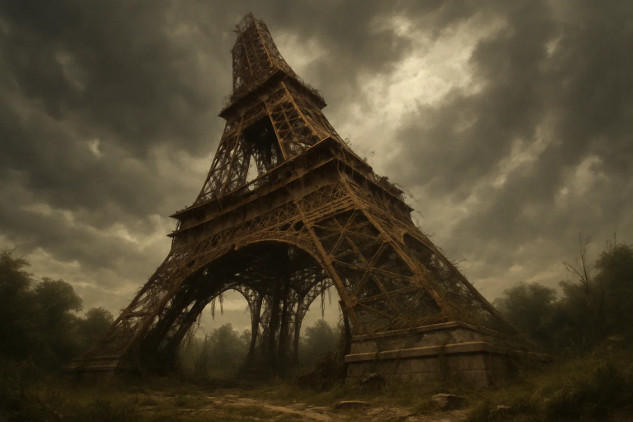
Liberté, égalité, fraternité... austerité? Seems the champagne ran out before the repairs did.
It’s easy to imagine that today’s spiraling inequality is some new monster — conjured up by Wall Street wizards, global tech giants, or the black magic of AI algorithms. But that’s wishful thinking. The forces driving this crisis are far older than stock markets and silicon chips. They’re wired into the very patterns of human society — and nature itself. Across species and civilizations, some inequality is natural, even useful. But when it crosses a certain threshold, it turns toxic. And when that happens, collapse doesn’t come as a surprise — it comes as a certainty.
History shows us that healthy societies can tolerate — and even benefit from — some inequality. Division of roles, respect for merit and leadership, different contributions to the group: all of this can enrich a community. In small bands of hunter-gatherers, skilled hunters or wise elders earned status — but not absolute power. Everyone still shared the hunt. The group still mattered more than the individual. Even as societies became more complex, stability depended on leaders upholding their end of the social contract: protecting the community, distributing resources fairly, maintaining trust. When they did, the system held. When they didn’t — well, you can guess what happened next.
That balance is fragile. Once leaders forget their obligations to the whole — once wealth and power concentrate in the hands of a few who exploit rather than serve — the rot begins. History is full of elites who convinced themselves they were entitled to permanent privilege while the majority struggled under crushing burdens. When the moral justification for hierarchy collapses, so does trust. Cooperation erodes. Conflict replaces it. And the society itself begins to fracture.
This isn’t just a human problem. Nature is full of cautionary tales — and we’d be wise to pay attention. Let’s start small: consider the ant colony. At first glance, it’s a picture of extreme inequality: one queen lays all the eggs while sterile workers do all the heavy lifting. But ant society works — because it’s biologically locked. No worker ant is sold a fantasy that if they just work harder, they’ll get to be queen someday. Roles are clearly defined and understood. And the colony operates for the survival of the group. The moment individual ants start hoarding resources or pursuing selfish gain, the colony suffers — and nature corrects it, or the colony collapses.
Now look at human societies. We’re not biologically locked this way. We thrive on the idea of mobility, merit, and fairness. And when elites hoard wealth and power while selling the myth that “anyone can make it if they just try hard enough,” the system corrodes from within. When the gap between promise and reality becomes too wide, trust implodes. Resentment festers. Legitimacy collapses. Unlike ants, we are conscious beings with moral expectations. And when those expectations are betrayed, the consequences are explosive.
Or take the much-maligned lemmings. The old story of suicidal mass migrations isn’t quite true — but the underlying dynamic is. In natural systems, when populations exceed the carrying capacity of their environment, collapse is inevitable. Nature enforces limits. Population crashes follow. In human terms, this is precisely what happens when economic elites pursue endless growth and consumption without regard for planetary boundaries. The wealthiest segments of society drive outsized resource extraction, carbon emissions, habitat destruction. The system looks stable — until it isn’t. Collapse then unfolds not as a single big bang, but as a cascade of failures: agricultural collapse, ecosystem breakdown, climate chaos, social upheaval.
We can also learn from our closest cousins. In primate societies, hierarchies are common. Dominant alphas often enjoy preferential access to food, mates, and attention. But even here, there are limits. Studies of chimpanzee and baboon troops show that when alphas monopolize too much, or rule by brute aggression, the troop fractures. Subordinates withdraw cooperation. Alliances form to challenge the alpha. Sometimes the result is outright violence and overthrow. Long-term stability requires balance. Leaders must maintain enough support to justify their role. Push too far, and the system self-corrects — often messily.
Now fast forward to the modern global elite. In many ways, they are behaving exactly like unstable alpha hoarders. A tiny fraction of humanity now controls a staggering share of wealth and resources. They fly private jets to climate summits. They build luxury compounds while public schools crumble. They fund political candidates who promise to entrench their privilege while dismantling what remains of the social safety net. And they imagine — foolishly — that they can insulate themselves from the collapse they are helping to engineer.
But here’s the hard truth: no society can survive this level of imbalance. History and nature alike warn us. As inequality grows, the social fabric frays. Trust evaporates. Cooperation dies. Polarization, extremism, and violence rise. And once the tipping point is crossed, collapse accelerates — faster than most elites ever imagine. Their bunkers and tax havens will not save them from what comes next.
We are not immune. The same forces that toppled Rome, pre-revolutionary France, and Weimar Germany are now unfolding at a global scale. Our elites may think they can buy their way out of the crisis — that they can fly over it, hide from it, or monetize the ruins. They are wrong. No gated community, no private island, no off-world colony will shield them from the long-term consequences of systemic collapse driven by extreme inequality.
The question is not whether collapse is possible. It is whether we will act — now, while there is still time — to prevent it. To understand how close we stand to the brink, we must turn to the hard lessons of history. The story of inequality and collapse is not some abstract theory — it is written in blood and ruins. And its echoes are growing louder all around us.
A Brief History Of Elite-driven Collapse
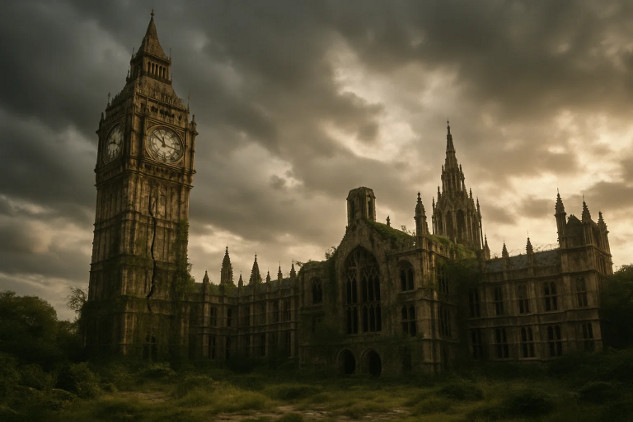
The clock still ticks — just not for social progress.
History, if we’re brave enough to look at it honestly, leaves very little mystery about what happens to unequal societies. The pattern is so reliable it may as well come with its own instruction manual: first wealth concentrates, then elites wall themselves off, the commons deteriorates, trust collapses — and finally, the whole system falls. Doesn’t matter if the currency is bronze coins, gold bars, or crypto tokens — the basic human dynamics remain unchanged. And yet, somehow, every generation of elites convinces itself that *this time will be different*. They’re cleverer. They have better technology. Surely they can dodge the laws of history. They never do.
The record is thick with cautionary tales. Here are just a few — each a big flashing warning light we’d do well to heed.
Late Roman Republic and Empire
Let’s start with Rome, the poster child of elite-driven collapse. For much of its early history, the Roman Republic was held up by a backbone of freeholding farmers — citizens who owned their land and fought in the legions when needed. Their modest prosperity supported a stable civic order and an army loyal to the state.
But then Rome’s military machine got too good at conquest. Wealth, slaves, and land poured into the hands of its senatorial elite. They built massive estates — the infamous *latifundia* — displacing those small farmers. Land and political power became locked up by a thin aristocracy, while the masses were pushed into urban poverty and dependence.
The consequences were as predictable as rain after thunder. The traditional military class eroded; poor citizens couldn’t afford arms. Generals started raising private armies from the landless poor — soldiers whose loyalty was now to their commander, not to the Republic. Political violence exploded. Senators bought influence with bribes and blood.
Meanwhile, the environment took a beating. The *latifundia* worked the land for short-term profit, not stewardship — draining soil fertility and stripping forests. Rome became hooked on imported grain to feed its citizens, further destabilizing its economic foundations.
In the end, the Republic collapsed into autocracy. What was lost wasn’t just a political system — it was a civic culture built on shared purpose. The late Roman Empire lumbered on, bloated and brittle, for centuries. But the rot began when wealth trumped responsibility. The lesson is loud and clear: concentrated wealth can unmake even the mightiest of civilizations.
Ancien Régime France
Fast forward to 18th-century France, a society so warped by inequality it practically begged for revolution. The Bourbon monarchy presided over a rigged game where the aristocracy and the Catholic Church hoarded wealth and privilege — and conveniently exempted themselves from taxes. The bill for running the state? That was dumped on the peasants and the rising middle class.
The tax system was a masterpiece of injustice — arbitrary, corrupt, and crushing. In some regions, peasants handed over up to 80 percent of their income to various layers of parasitic elites. Meanwhile, the glittering court at Versailles burned through public funds like there was no tomorrow. Which, as it turned out, there wasn’t.
Environmental degradation only poured fuel on the fire. Centuries of deforestation for aristocratic hunting grounds and industry left much of France vulnerable to floods and erosion. Poor land management and bad weather triggered crop failures in the 1780s, pushing millions to the brink of starvation.
When the revolution came, it wasn’t just about overthrowing the king — it was a full-throated rejection of an entire system of elite extraction. The storming of the Bastille and the Reign of Terror weren’t spontaneous outbursts. They were the natural result of a social contract so thoroughly broken that violence became inevitable.
Gilded Age America
Now let’s talk about the good old U.S. of A. The late 19th century — the so-called Gilded Age — saw unprecedented economic growth and equally grotesque inequality. Industrial barons like Rockefeller, Carnegie, and Morgan amassed fortunes that made even European aristocrats look modest. And they didn’t just hoard wealth — they bought political influence outright. Machines like Tammany Hall didn’t run on civic virtue. They ran on cold, hard cash.
The human cost was staggering. Urban slums overflowed with desperate workers. Child labor was rampant. Workplace accidents maimed thousands with little to no recourse. And when laborers organized to demand dignity, they were often met with clubs and bullets, courtesy of private militias or the government itself.
Nature didn’t fare much better. Rivers ran black with chemical waste. Coal smoke choked the air. Land was gouged and scarred without a second thought. The ideology of unrestrained capitalism treated people and planet alike as disposable inputs to be squeezed for maximum profit.
Yet the very extremity of the Gilded Age provoked a backlash. The Progressive Era that followed brought vital reforms: antitrust laws, labor protections, environmental safeguards, and expanded political rights. This was no accident — it was a forced correction. Without those changes, it’s doubtful whether American democracy would have survived the pressures of the 20th century.
Weimar Germany
Weimar Germany gives us one of the clearest — and most chilling — examples of how inequality can crack a society wide open. In the wake of World War I, the Treaty of Versailles imposed crippling reparations on Germany. The economy spiraled. Hyperinflation in the early 1920s wiped out middle-class savings. The working poor faced mass unemployment and destitution.
Meanwhile, a small group of industrialists and financiers preserved — and grew — their wealth through speculation. The social resentment this bred was dynamite waiting for a match. The Nazis provided that match, posing as champions of the "forgotten worker" while securing financial backing from oligarchs terrified of communism.
The results were catastrophic. Germany’s war machine consumed vast resources, ravaged Europe’s landscapes, and left millions dead. The moral collapse was total — and it stemmed from elites who chose authoritarianism to preserve their privilege rather than embracing democratic reform.
Post-Soviet Russia
More recently, post-Soviet Russia offers a grim warning about elite capture and societal decay. When the USSR collapsed, the "shock therapy" privatization of state assets turned a few well-connected insiders into oligarchs overnight. They used their newfound wealth to seize political power, ensuring the rules stayed rigged in their favor.
The social costs were brutal. Life expectancy nosedived. Poverty and inequality soared. Infrastructure crumbled. Environmental protections were gutted in the rush to exploit natural resources. Public faith in democracy evaporated — clearing the way for Putin to consolidate an authoritarian regime wrapped in nationalist rhetoric and backed by oligarchic interests.
Today, Russia stands as a stark example of what happens when concentrated wealth hollow out a nation from within — breeding corruption, repression, and environmental devastation in its wake.
The Pattern Repeats
Across all these cases — Rome, France, America, Germany, Russia — the pattern is impossible to miss:
Wealth concentration leads to political capture. Political capture erodes trust and guts institutional legitimacy. Governance fails the common good. Environmental exploitation accelerates. Social cohesion fractures. Collapse follows — whether in a sudden cascade or a long, grinding decline.
And here’s the kicker: today’s global elites are running this same ancient script with alarming precision. They may think their bunkers, yachts, or offshore accounts will shield them. They are wrong. History offers little comfort — but it does offer clear lessons, if we have the courage to learn them. The time to change course is running out fast.
Today’s Global Inequality Crisis
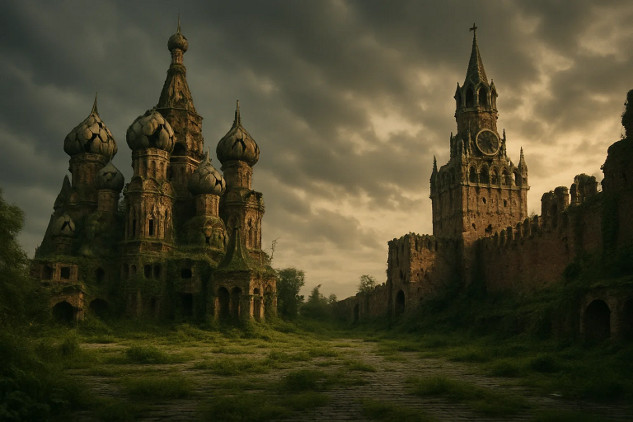
Turns out authoritarianism ages about as well as unrefrigerated borscht
It’s tempting — especially for Americans — to think that inequality is some uniquely homegrown disease. A side effect of Wall Street greed, political dysfunction, or our peculiar national obsession with “winners” and “losers.” But that view is outdated. What we are seeing now is not just an American problem. It’s a global pattern — and one that should be setting off alarm bells in every capital, boardroom, and newsroom on the planet.
The symptoms are the same everywhere: wealth piling up at the top, political systems bending to serve the wealthy, public trust crumbling, environmental destruction accelerating, and authoritarian tendencies creeping in through the cracks. History isn’t just repeating itself in one country anymore. It’s rhyming — loudly — across the entire globe.
In the United States, the shift began in earnest in the 1980s. The so-called “neoliberal revolution” didn’t just tweak the system — it rewired it. The postwar era of broadly shared prosperity, built on strong unions, progressive taxation, and public investment, was dismantled in favor of deregulation, privatization, and tax cuts for the rich. The result? The top 0.1 percent now claim more than three times the share of national income they did in 1980. Entire sectors — housing, healthcare, education — have been turned into speculative casinos for the wealthy, while most Americans fight just to stay afloat.
Across the pond, the U.K. followed a parallel script under Margaret Thatcher. Deregulation, privatization, and the gutting of labor protections produced an economy increasingly dominated by finance and real estate. London became a global playground for billionaire wealth — much of it arriving in suitcases of dubious origin. Meanwhile, entire industrial regions were gutted and left to rot. The predictable political fallout? A potent brew of resentment, nostalgia, and the siren song of authoritarian solutions.
China is often praised for lifting hundreds of millions out of poverty — and rightly so. But in recent decades, extreme inequality has taken root. A new billionaire class, often tied to opaque political networks, towers above vast swaths of migrant workers and rural poor. The Party periodically stages anti-corruption crackdowns to appease public anger, but the deeper dynamic remains: a society where wealth and power are concentrating fast, and social mobility is becoming a fantasy for most.
India offers its own variant of the pattern — blending ancient caste hierarchies with modern capitalist inequality. While a small elite enjoys global lifestyles in gleaming urban centers, vast segments of the population remain trapped in poverty and informal labor. Crony capitalism and political patronage distort development. Environmental destruction — poisoned rivers, disappearing forests — hits the poorest hardest. And as always, rising inequality fuels political extremism and sectarian nationalism, which in turn distract from the rigged game being played at the top.
Russia? The story is grimly familiar. The wild privatizations of the 1990s handed state assets to a new class of oligarchs, who quickly captured the political system to protect their newfound wealth. Today, the state serves elite interests, dissent is crushed, and environmental protections have been sacrificed on the altar of resource extraction. What remains is a brittle authoritarian regime held together by propaganda and repression — the modern version of Rome’s imperial decay, with oil pipelines instead of aqueducts.
Latin America has long been a laboratory of inequality-driven instability. The cycle is well worn: wealth concentration, populist revolt, authoritarian backlash, rinse and repeat. Brazil offers a prime example. The Amazon — a global treasure — is being sacrificed for short-term profit, largely to benefit agribusiness giants and resource barons. Meanwhile, political systems lurch between fragile democracy and creeping autocracy, with inequality always smoldering beneath the surface, ready to ignite.
Even Scandinavia, long held up as a beacon of egalitarian social democracy, is starting to fray. The forces of financialization and globalization have seeped in. In Sweden and Denmark, wealth concentration is rising, public services are under pressure, and political discourse is growing more polarized. The hard-won social fabric of these societies is under strain — proof that no nation is immune from the corrosive pull of elite excess.
Across this global landscape, elite behaviors are disturbingly consistent — and eerily reminiscent of the collapse phases we’ve seen throughout history. Today’s tech billionaires, flush with more wealth than medieval monarchs could dream of, are no longer content just shaping markets. They want to shape politics. In the U.S., they pour millions into campaigns designed to further entrench their privileges. Supreme Court rulings like Citizens United have turned money into political muscle, while movements like Project 2025 aim to reshape government itself into an instrument of elite control.
Meanwhile, elite lifestyles are driving the environmental crisis at breakneck speed. Private jets flit between climate summits. Mega yachts clog pristine harbors. The richest ten percent of humanity now account for roughly half of all global carbon emissions. These aren’t harmless indulgences — they are structural accelerants of collapse. And the hypocrisy is galling: the same elites lecturing us about sustainability while treating the planet as their personal playground.
Political capture is now a global phenomenon. Corporate lobbying, tax havens, and regulatory rollbacks ensure that public policy increasingly serves those at the top. As governments fail to address the needs of ordinary people, the door opens wider for authoritarian drift. Propaganda and disinformation — often funded or enabled by elites — exploit social divisions, erode trust, and weaken democracy. We’ve seen this in the U.S., in Brexit Britain, in Russia, and in the rise of strongman populists worldwide.
The pattern is ancient. What’s new is the scale. For the first time, inequality-driven collapse is unfolding not within a single empire or nation, but across the entire planet. Technologies of globalization and digital finance have turbocharged wealth concentration. The environmental impacts of elite consumption now threaten the biosphere itself. And the political consequences are shaking democracies to their core, everywhere from Washington to Warsaw to New Delhi.
The warning signs could not be clearer. This is not a series of isolated crises — it is a global inequality crisis playing out at unprecedented speed. The echoes of history are deafening. And unless we confront the moral failures driving this crisis, we are setting ourselves up to repeat a pattern that has spelled ruin for countless civilizations before ours — only this time, on a planetary scale.
How Inequality Drives Environmental Collapse
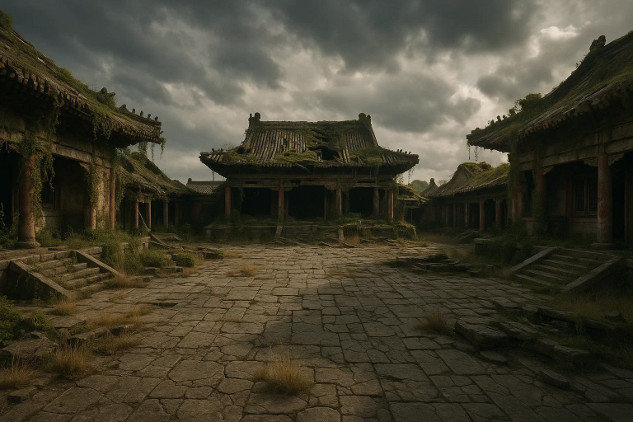
All the surveillance cameras in the world can’t watch the roof cave in.
One of the most dangerous myths of our time is the idea that the environmental crisis is some grand, collective failure of “humanity.” You hear it everywhere: “We’re all responsible.” “It’s just the tragedy of the commons.” “Too many people.” But scratch the surface, and this narrative crumbles — revealing itself for what it really is: a convenient excuse for the people driving the collapse to keep driving it.
Here’s the truth: the global environmental crisis is overwhelmingly fueled by the consumption patterns of the wealthiest. The richest ten percent of humanity are responsible for nearly half of global CO₂ emissions. The poorest half? Just ten percent. This isn’t some tragic side effect of population growth. It’s the direct result of a global economy built to serve an elite minority — and to shove the consequences onto everyone else.
Yet the old canard of “overpopulation” remains popular in elite circles, for one simple reason: it shifts blame. It’s easier to wag a finger at poor families for having too many children than to face the reality that a single billionaire’s lifestyle — with private jets, mega yachts, and climate-controlled mega-mansions — pumps out more emissions in a month than a subsistence farmer in sub-Saharan Africa will in a lifetime. This isn’t a new trick. History is littered with elites blaming the victims of systems they themselves built and rigged.
Take the Roman Empire. The glorious public works we admire today — aqueducts, roads, baths — masked a deeper story of environmental exploitation. Deforestation across the Mediterranean wasn’t driven by peasant farmers. It was driven by elite demand: timber for warships, villas, and imperial monuments. The creation of massive latifundia estates led to soil exhaustion and erosion. As agricultural productivity fell, the Roman economy became more brittle, more fragile — and ordinary people bore the costs. Sound familiar?
Or look at European colonialism. Natural resources were extracted not to serve the needs of local populations, but to fuel elite consumption and industrial profits back in Europe. Forests felled, rivers dammed, minerals stripped — all to line the pockets of imperial investors. Indigenous communities were displaced. Ecosystems were shattered. And when the plunder was complete, elites patted themselves on the back and called it "civilization." The poisoned mines of Africa and the deforested lands of Southeast Asia still bear the scars of that moral crime.
The modern fossil fuel industry is the same old game in a new suit. Extraction and burning of coal, oil, and gas remain the primary drivers of climate change. And who profits? The shareholders of multinational energy giants — many nestled comfortably in the global elite. These corporations spend billions lobbying to delay climate action — not because they’re confused, but because they know exactly what they’re protecting: their own profits. Political capture keeps real reform off the table. The pattern has not changed. It’s still elite interests versus the public good — and the planet is losing.
But inequality doesn’t just drive environmental destruction — it cripples our ability to fight it. The wealthy can insulate themselves from the early effects of collapse. They buy time for themselves — not for the rest of us. Gated communities, fortified compounds, private healthcare, the ability to move away from climate disasters — all of it serves to cushion elites from the consequences of their own consumption.
That insulation breeds moral hazard. Those with the most power to change the system feel the least urgency to do so. They can afford to wait out the early storms while the poor are left to drown — both literally and figuratively. The result? Delay. Denial. Half-measures dressed up as solutions. We get carbon markets instead of binding emissions cuts. Tech fantasies instead of hard choices. A steady parade of conferences where the rich arrive by private jet to tell the rest of us to drive less and turn down the thermostat.
Worse, some elites are now finding ways to profit from collapse itself. Natural resources are being financialized — turned into speculative assets. Companies are buying up water rights, turning a basic human need into a vehicle for profit. Carbon offset markets allow polluters to greenwash their image while continuing business as usual. And let’s not forget disaster capitalism: when crisis hits, private firms swoop in to cash in on reconstruction, security contracts, and privatized emergency services. For this crowd, collapse isn’t a tragedy — it’s a business opportunity.
And here’s the real danger: once inequality reaches a certain level, the political system becomes so captured that meaningful reform is nearly impossible. The game is rigged so thoroughly that even popular protest struggles to break through. Trust in institutions evaporates — for good reason. Movements get co-opted or crushed. Public discourse becomes poisoned by disinformation, much of it funded or amplified by elites themselves. By the time rupture becomes inevitable, the window for preventing environmental catastrophe may have already slammed shut.
At its core, environmental collapse is not a technical failure. We know how to reduce emissions. We know how to restore ecosystems. The science is there. The technology exists. The problem is moral. It is the refusal of those with wealth and power to change — to sacrifice some privilege today to preserve a livable world tomorrow. Again and again, they choose short-term gain over long-term survival, because the immediate rewards of hoarding seem to outweigh the distant risks of collapse — at least for them.
Societies collapse when their elites refuse to share power and resources until it is too late. They double down on extraction, repression, and escapism instead of embracing reform and solidarity. Environmental collapse follows the same script. We are not on this path because "humanity" is flawed. We are here because a minority of humanity refuses to surrender privileges that are destroying the planet. Until that moral failure is confronted — until inequality itself is addressed — no amount of green tech or clever accounting will save us.
The hour is late. The pattern is painfully clear. The choice is still ours — but not for long.
The Slippery Slope We Are Now On
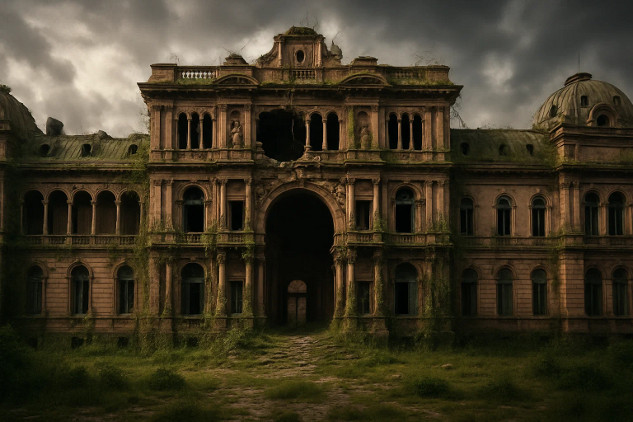
When economic collapse meets climate collapse, even pink palaces fade to green.
By now, the pattern should be painfully familiar. Across centuries and continents, societies that let extreme inequality fester all end up on the same slick incline — one that accelerates fast once things start sliding. It’s a slippery slope, and like any good slippery slope, what begins as slow erosion soon becomes an uncontrollable plunge. We are far closer to that plunge than most dare admit.
The process almost always starts the same way: the gap between rich and poor widens. Sometimes it’s conquest — think ancient Rome. Sometimes it’s structural privilege — Ancien Régime France. Sometimes it’s good old market rigging — Gilded Age America. Sometimes it’s outright theft — post-Soviet Russia. The method doesn’t matter. The result is the same: a tiny elite consolidates wealth and power while the rest scramble to keep their heads above water.
Next comes political capture. The wealthy don’t just hoard money — they buy influence. Laws get rewritten to protect privilege. Taxes on the rich? Slashed or dodged entirely. Public services? Left to wither. Regulatory agencies? Defanged or packed with industry cronies. The media? Flooded with narratives that defend the status quo and tell struggling people it’s all their fault. Sound familiar? You’re living it.
With the government now serving elite interests, its capacity to deal with real problems collapses. Welcome to governance paralysis. Global pandemic? Environmental collapse? Mass inequality? You get dithering, denial, or empty PR. Trust in public institutions erodes fast. Cynicism replaces civic engagement. The system starts rotting from the inside out.
Meanwhile, environmental collapse starts to bite. Deforestation accelerates. Emissions keep rising. Oceans warm, acidify. Weather goes haywire. Yet those with the power to act? They’re tucked away behind the walls of gated compounds and private islands, convinced they can ride out the storm. And for a while, they can — but not forever.
As environmental stress mounts, social cohesion shreds. The pain of collapse isn’t shared equally — the poor and marginalized suffer first and worst. Food and water insecurity rise. Mass migration strains borders. Political discourse turns toxic. Extremist movements surge. Trust between groups dissolves. Violence — rhetorical at first, then physical — becomes commonplace. The fabric of society unravels.
At this point, the crisis is fully visible. The status quo can’t hold. Governing institutions lose legitimacy. And now comes the fork in the road: reform — or repression.
Reform means elites choosing to surrender some privilege, rebuild trust, and serve the common good. It’s risky. It takes courage. And historically? It’s rare. The more common playbook is authoritarian clampdown: crush dissent, scapegoat minorities, manipulate public fears, hoard power even tighter. This buys the elite some time — but not stability. It creates a brittle authoritarianism that may limp on for years or decades but will ultimately collapse under its own contradictions. You can’t plaster over rot forever.
And here we are. The world is now deep into late-phase inequality. The top 0.1 percent control more wealth than entire nations. Political capture is so blatant it barely shocks anymore. Governance paralysis is everywhere: international bodies can’t muster a coherent climate plan, nations can’t handle pandemics without chaos, financial crises roll through with alarming regularity — and no real fixes follow.
The environmental picture grows darker by the day. The latest IPCC reports read like horror novels: rising seas, deadly heatwaves, megafires, ecosystem collapse. The window for avoiding catastrophic warming is closing fast — yet emissions keep rising. The gap between what is needed and what is happening is a chasm.
Social fragmentation is keeping pace. Trust in democracy is at historic lows. Polarization is deepening. Extremist movements are surging — often with elite backing. In the U.S., Project 2025 seeks to lock in minority rule through permanent institutional changes. Across Europe, the far-right is winning elections by stoking fear and division. In India, sectarian nationalism is tearing at the fabric of democracy. And Russia, Turkey, Hungary — the model of brittle authoritarianism is alive and spreading.
History is screaming a warning: the window for reform is closing fast. Once inequality reaches certain thresholds — as it already has — the feedback loops kick in. Elite capture, governance failure, environmental destruction, social division — each feeds the next. Each year of inaction makes reversal harder. Each elite concession extracted now costs more than it would have a decade ago. Trust erodes further. The slope steepens.
But collapse is not inevitable. The slope is treacherous — but not yet terminal. There are still choices to be made. Political leaders, civil society, ordinary citizens — we all still have a say in how this story ends. History offers rare but real examples of societies that pulled back from the brink — through courageous reforms and a renewed sense of shared purpose. But the first step is brutal honesty: about where we are, how we got here, and what must change. Without that honesty, the slope becomes a freefall.
We are living through one of the most perilous moments in human history. The forces of inequality, environmental breakdown, and political decay are converging on a planetary scale. But so too is the opportunity for a different path — if we have the clarity and the courage to take it. The next chapter is not written yet. The question is simple: will we choose to write it — or allow the same ancient forces that toppled countless civilizations to do it for us?
What History Tells Us: Is Reversal Possible?
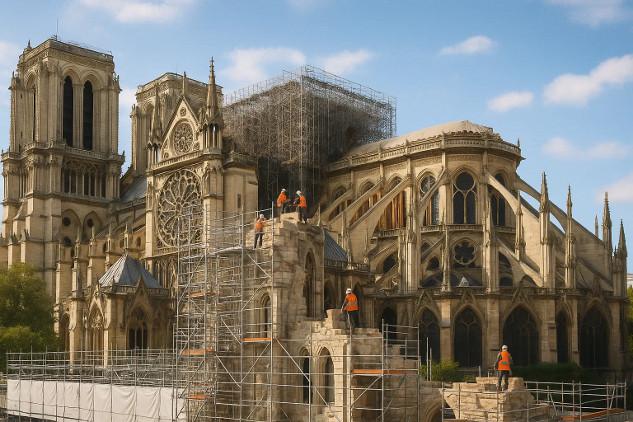
A rare sight these days — scaffolding going up before society comes down.
If this story has sounded bleak so far — well, it should. The forces driving us toward collapse are real, they’re accelerating, and they’re baked deep into human history. But here’s the thing: collapse, while common, is not inevitable. There have been moments — rare, hard-won moments — when societies recognized the danger of extreme inequality and chose to change course. These moments remind us that while the slope is slippery, it isn’t a one-way chute to ruin. They also show us what turning around requires — and why it’s so damn difficult.
Take the late 19th and early 20th century United States. The Gilded Age was a master class in inequality run wild: corrupt politics, brutal working conditions, environmental devastation, and a handful of industrial barons running the country like a personal bank. By the 1890s, the whole system was teetering. Labor strikes were flaring up. Populist uprisings were shaking the establishment. The public was seething with outrage at the excesses of wealth.
And yet — the U.S. didn’t descend into full collapse or authoritarianism. Instead, it took a hard, halting turn toward reform. The Progressive Era wasn’t handed down from on high. It was driven by muckraking journalists exposing corporate crimes, labor movements demanding rights, middle-class reformers pushing for political accountability — and yes, a few elites smart enough to realize that if they didn’t bend, the system would break.
The gains were significant, though far from complete. Antitrust laws clipped the wings of corporate monopolies. Labor protections improved conditions for workers and strengthened unions. Political reforms made government at least a little more accountable. Conservation efforts laid the first stones for modern environmental protection. Tax reforms, especially during and after World War I, restored some fiscal balance. None of this happened by accident. It was the result of massive public pressure — and elites recognizing that their survival depended on giving ground.
The mid-20th century offers an even more powerful example. After the twin cataclysms of the Great Depression and World War II, much of the developed world chose a new path — one forged from the wreckage of economic collapse and fascism. Western Europe, Scandinavia, Canada, parts of the U.S. — these societies built stronger, fairer, more resilient democracies. The lesson was simple: if you want peace and prosperity, you can’t allow wealth and power to concentrate unchecked.
They acted on that lesson. Progressive taxation reined in extreme wealth. Strong labor protections ensured that workers shared in economic growth. Universal healthcare, public education, and social safety nets fostered trust and solidarity. Political reforms aimed to make governments more transparent and responsive. And it worked. These societies enjoyed unprecedented prosperity, stability, and resilience — not in spite of equality, but because of it.
And here’s the kicker: the benefits weren’t just moral. Societies with lower inequality and higher trust are better at handling shocks, more capable of collective action, and more likely to sustain healthy democracies. The postwar social democracies were proof of that. They were the antidote to collapse — for a time.
But even the best gains are fragile. Over the past four decades, neoliberal policies — tax cuts for the rich, deregulation, privatization, union-busting — have steadily eroded the foundations of equitable society. The forces that previous generations fought to contain are back, supercharged by new technologies and global capital flows. History warns us: if this continues, the window for peaceful reform will close — fast.
So what do these hard-earned reversals teach us about what’s needed today?
First, they show that change requires a conscious moral choice — by political leaders and by the public. Tinkering won’t cut it. We have to recognize that inequality isn’t just an unfortunate side effect of progress — it is a direct threat to social and environmental stability. And reversing it means making hard choices, not polite gestures.
Second, we must be ready to confront entrenched wealth and power. Elites never surrender privilege willingly. Every major reform in history — antitrust laws, the New Deal, postwar social democracy — was met with fierce, often violent resistance. Success requires organized movements, sustained public pressure, and political leadership with the backbone to withstand the inevitable backlash.
Third, we must rebuild social trust and a sense of common purpose. Inequality doesn’t just wreck economies — it poisons the social fabric. Polarization, cynicism, scapegoating — these are the natural byproducts of extreme disparity. To pull back from the brink, we need to invest in the public good: education, healthcare, infrastructure, and democratic institutions that serve everyone. That’s how you rebuild solidarity. That’s how you restore trust.
Finally — and this is critical — timing matters. The opportunity for reform shrinks as inequality deepens and trust erodes. The longer we wait, the harder the path becomes. The Progressive Era succeeded because reform came before full collapse. Postwar social democracy happened because leaders seized a moment of shared trauma. If we wait until the next big crisis fully explodes, the odds of peaceful, democratic reform will plummet.
And this time, the stakes are global. The forces driving collapse aren’t confined to one country. Financialized capitalism, climate change, technological disruption, elite political capture — these are planetary problems. Addressing them will require coordinated action across borders, across cultures, across systems. That’s an unprecedented challenge — but also an unprecedented opportunity. Never before have we had this much knowledge, this many tools, or this much historical perspective. The question is whether we’ll use them — or squander them.
The next section will ask the question that now faces all of us: will we summon the courage to choose a different path — or will we repeat the same tragic mistakes that have doomed so many civilizations before us? History gives us the map. The choice is still ours.
The Moral Choice Before Us
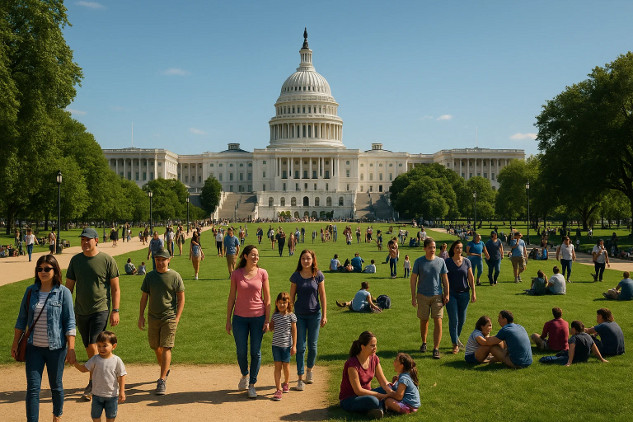
The hardest restoration of all: trust, community, and a future worth walking toward — together. “Hope is not the conviction that something will turn out well, but the certainty that something makes sense, regardless of how it turns out.” — Vaclav Havel — Czech playwright, dissident, and the first president of the Czech Republic after the fall of communism.
Collapse is always a moral story. Let’s be clear about that. It isn’t some freak of nature or failure of technology. It happens because people — especially those with power — make choices. Choices to protect their own comfort, status, and short-term gain instead of the common good and the long-term future. Collapse happens when those with the most to lose from real change resist it until it is too late. And it happens when ordinary citizens are persuaded — often deliberately — that they are powerless to alter the course of history.
In the past, when civilizations fell, human life continued. When Rome crumbled, there were still farms and villages. When the French monarchy was toppled, a new society eventually rose. Even the horrors of the 20th century — world wars, genocides, famines — left something to rebuild from. The earth’s ecosystems, battered but alive, provided the space and the resources for recovery. Collapse was brutal for those who lived through it — but it did not threaten the very continuity of the human story.
That is no longer the case. This time really is different — and we need to stop pretending otherwise. The scale of today’s inequality, the speed of our consumption, the fragility of our interconnected global systems — all of it has brought us to a place no civilization has faced before. We are staring into the abyss of potential human extinction. Not centuries from now. Not in some science fiction dystopia. Within the lifetimes of our children or grandchildren. We may have just a couple of generations left to reverse course — or to tip past a point where organized human life becomes impossible across vast swaths of this planet.
That’s not hyperbole. It’s the plain, documented conclusion of decades of scientific research — on climate change, biodiversity collapse, soil loss, ocean acidification, and resource depletion. You can read it in the IPCC reports. You can hear it from scientists begging for action. The natural systems that sustain life are breaking under the strain of human excess. If we continue on this path, they will fail. And when they fail, human civilization goes with them. Simple as that.
And here’s the part too many still shy away from saying out loud: this environmental collapse is inseparable from the moral failure of inequality. It is not “humanity” in some vague, collective sense that brought us here. It is the deliberate choices of an elite minority — a small fraction of humanity whose wealth and power depend on endless extraction and exploitation. The richest consume the most. They emit the most. They control the political systems that block meaningful change. They profit from delay and denial, even as the window for action slams shut.
We know this pattern. We’ve seen it play out again and again: wealth concentrates, elites capture government, trust in institutions collapses, the environment degrades, and society spirals toward ruin. But this time, there will be no untouched corner of the world to start over from. No refuge in some distant land. The crisis is global. The consequences will be felt by everyone — and most cruelly by those who did the least to cause it.
So here we are. The moral choice is now stark. Will we let wealth continue to devour the earth and democracy? Will we let it drive us further down this terminal slope? Or will we choose — while there is still time — to reclaim a path of shared responsibility, solidarity, and stewardship?
And let’s not kid ourselves: this won’t be solved by technology alone. It won’t be solved by tweaking the system or making nice speeches at climate summits. It requires a profound shift in values and priorities. A reassertion of the commons over private privilege. Of future generations over immediate profit. Of life itself over the narrow interests of the few who have rigged the game.
History gives us both warnings and hope. Yes, the pattern of collapse is clear. But so is the fact that societies can reverse course — if they confront these dynamics head-on and act. The difference this time is that we know the pattern. We have no excuse. Past civilizations walked blind into collapse. We can see the road we’re on in excruciating detail. The warnings are clear. The science is clear. The responsibility is ours.
There is no guarantee we will choose wisely. But we still have a choice. And that, perhaps, is the greatest difference between this crisis and those that came before. We can still avert the worst — but only if we act with honesty, courage, and urgency. Delay is complicity. Denial is moral failure. The time for small steps is over. We need bold, systemic change — driven by the recognition that the future of life on this planet depends on it.
In the end, this is not just a political or economic question. It is a question of who we are — and who we want to be. Will we let this extraordinary moment in human history — this moment where, for the first time, we have the knowledge and tools to build a just and sustainable global civilization — slip away in a final orgy of greed and denial? Or will we rise to meet the moment, honor the generations that came before us, and safeguard the future for those yet to come?
Unlike past civilizations, we know the script. We can’t plead ignorance. The choice is ours. And the time to make it — truly make it — is now. Before the slope grows too steep to climb back.
About the Author
 Robert Jennings is the co-publisher of InnerSelf.com, a platform dedicated to empowering individuals and fostering a more connected, equitable world. A veteran of the U.S. Marine Corps and the U.S. Army, Robert draws on his diverse life experiences, from working in real estate and construction to building InnerSelf with his wife, Marie T. Russell, to bring a practical, grounded perspective to life’s challenges. Founded in 1996, InnerSelf.com shares insights to help people make informed, meaningful choices for themselves and the planet. More than 30 years later, InnerSelf continues to inspire clarity and empowerment.
Robert Jennings is the co-publisher of InnerSelf.com, a platform dedicated to empowering individuals and fostering a more connected, equitable world. A veteran of the U.S. Marine Corps and the U.S. Army, Robert draws on his diverse life experiences, from working in real estate and construction to building InnerSelf with his wife, Marie T. Russell, to bring a practical, grounded perspective to life’s challenges. Founded in 1996, InnerSelf.com shares insights to help people make informed, meaningful choices for themselves and the planet. More than 30 years later, InnerSelf continues to inspire clarity and empowerment.
Creative Commons 4.0
This article is licensed under a Creative Commons Attribution-Share Alike 4.0 License. Attribute the author Robert Jennings, InnerSelf.com. Link back to the article This article originally appeared on InnerSelf.com
Recommended books:
Capital in the Twenty-First Century
by Thomas Piketty. (Translated by Arthur Goldhammer)
 In Capital in the Twenty-First Century, Thomas Piketty analyzes a unique collection of data from twenty countries, ranging as far back as the eighteenth century, to uncover key economic and social patterns. But economic trends are not acts of God. Political action has curbed dangerous inequalities in the past, says Thomas Piketty, and may do so again. A work of extraordinary ambition, originality, and rigor, Capital in the Twenty-First Century reorients our understanding of economic history and confronts us with sobering lessons for today. His findings will transform debate and set the agenda for the next generation of thought about wealth and inequality.
In Capital in the Twenty-First Century, Thomas Piketty analyzes a unique collection of data from twenty countries, ranging as far back as the eighteenth century, to uncover key economic and social patterns. But economic trends are not acts of God. Political action has curbed dangerous inequalities in the past, says Thomas Piketty, and may do so again. A work of extraordinary ambition, originality, and rigor, Capital in the Twenty-First Century reorients our understanding of economic history and confronts us with sobering lessons for today. His findings will transform debate and set the agenda for the next generation of thought about wealth and inequality.
Click here for more info and/or to order this book on Amazon.
Nature's Fortune: How Business and Society Thrive by Investing in Nature
by Mark R. Tercek and Jonathan S. Adams.
 What is nature worth? The answer to this question—which traditionally has been framed in environmental terms—is revolutionizing the way we do business. In Nature’s Fortune, Mark Tercek, CEO of The Nature Conservancy and former investment banker, and science writer Jonathan Adams argue that nature is not only the foundation of human well-being, but also the smartest commercial investment any business or government can make. The forests, floodplains, and oyster reefs often seen simply as raw materials or as obstacles to be cleared in the name of progress are, in fact as important to our future prosperity as technology or law or business innovation. Nature’s Fortune offers an essential guide to the world’s economic—and environmental—well-being.
What is nature worth? The answer to this question—which traditionally has been framed in environmental terms—is revolutionizing the way we do business. In Nature’s Fortune, Mark Tercek, CEO of The Nature Conservancy and former investment banker, and science writer Jonathan Adams argue that nature is not only the foundation of human well-being, but also the smartest commercial investment any business or government can make. The forests, floodplains, and oyster reefs often seen simply as raw materials or as obstacles to be cleared in the name of progress are, in fact as important to our future prosperity as technology or law or business innovation. Nature’s Fortune offers an essential guide to the world’s economic—and environmental—well-being.
Click here for more info and/or to order this book on Amazon.
Beyond Outrage: What has gone wrong with our economy and our democracy, and how to fix it -- by Robert B. Reich
 In this timely book, Robert B. Reich argues that nothing good happens in Washington unless citizens are energized and organized to make sure Washington acts in the public good. The first step is to see the big picture. Beyond Outrage connects the dots, showing why the increasing share of income and wealth going to the top has hobbled jobs and growth for everyone else, undermining our democracy; caused Americans to become increasingly cynical about public life; and turned many Americans against one another. He also explains why the proposals of the “regressive right” are dead wrong and provides a clear roadmap of what must be done instead. Here’s a plan for action for everyone who cares about the future of America.
In this timely book, Robert B. Reich argues that nothing good happens in Washington unless citizens are energized and organized to make sure Washington acts in the public good. The first step is to see the big picture. Beyond Outrage connects the dots, showing why the increasing share of income and wealth going to the top has hobbled jobs and growth for everyone else, undermining our democracy; caused Americans to become increasingly cynical about public life; and turned many Americans against one another. He also explains why the proposals of the “regressive right” are dead wrong and provides a clear roadmap of what must be done instead. Here’s a plan for action for everyone who cares about the future of America.
Click here for more info or to order this book on Amazon.
This Changes Everything: Occupy Wall Street and the 99% Movement
by Sarah van Gelder and staff of YES! Magazine.
 This Changes Everything shows how the Occupy movement is shifting the way people view themselves and the world, the kind of society they believe is possible, and their own involvement in creating a society that works for the 99% rather than just the 1%. Attempts to pigeonhole this decentralized, fast-evolving movement have led to confusion and misperception. In this volume, the editors of YES! Magazine bring together voices from inside and outside the protests to convey the issues, possibilities, and personalities associated with the Occupy Wall Street movement. This book features contributions from Naomi Klein, David Korten, Rebecca Solnit, Ralph Nader, and others, as well as Occupy activists who were there from the beginning.
This Changes Everything shows how the Occupy movement is shifting the way people view themselves and the world, the kind of society they believe is possible, and their own involvement in creating a society that works for the 99% rather than just the 1%. Attempts to pigeonhole this decentralized, fast-evolving movement have led to confusion and misperception. In this volume, the editors of YES! Magazine bring together voices from inside and outside the protests to convey the issues, possibilities, and personalities associated with the Occupy Wall Street movement. This book features contributions from Naomi Klein, David Korten, Rebecca Solnit, Ralph Nader, and others, as well as Occupy activists who were there from the beginning.
Click here for more info and/or to order this book on Amazon.
Article Recap
Collapse is not an accident of nature — it is driven by the moral failures of extreme inequality and elite capture. History offers warnings, but also hope: reversal is possible, if we act now with honesty, courage, and collective will. The choice remains ours — but time is short.
#inequalitycollapse #environmentalcollapse #societalbreakdown #climatejustice #wealthinequality #planetarycrisis #reversingcollapse #moralchoice #elitecapture #globalwarning



